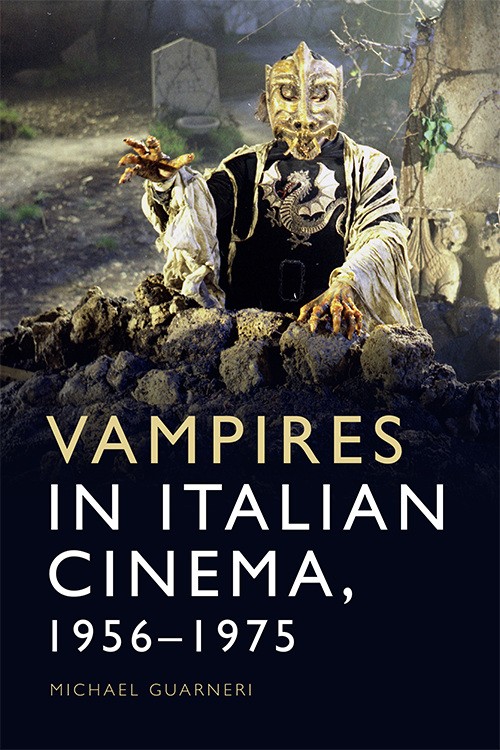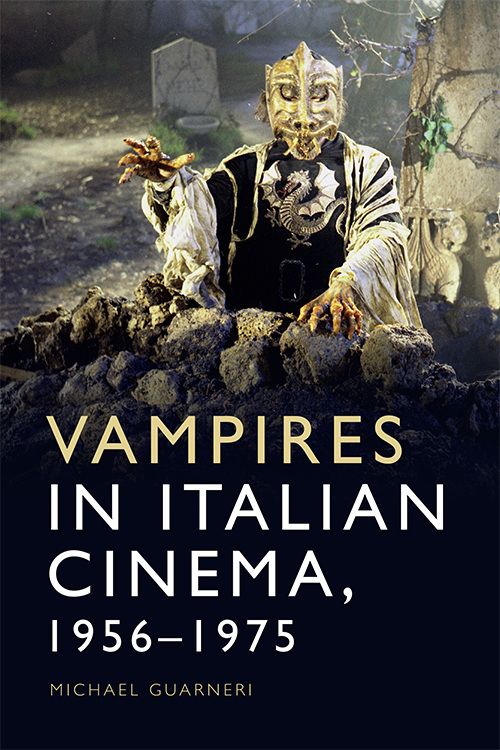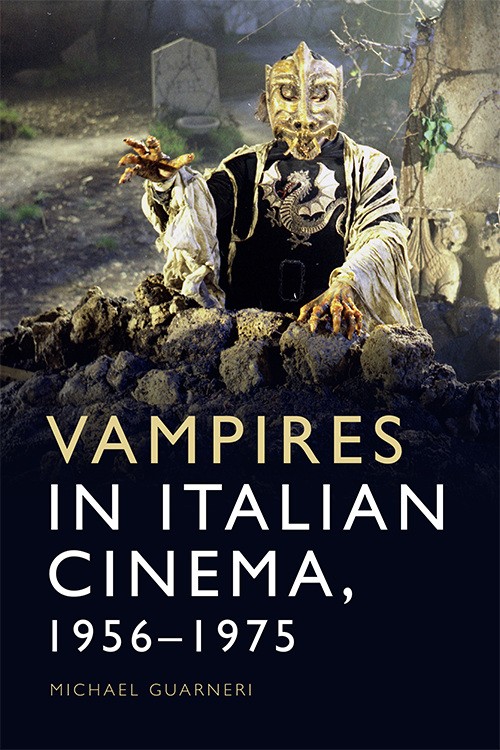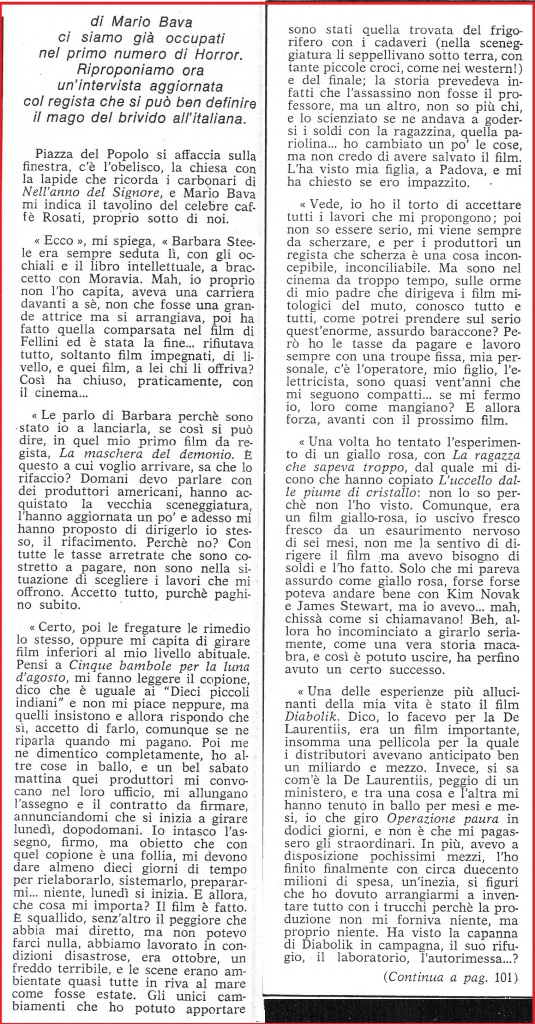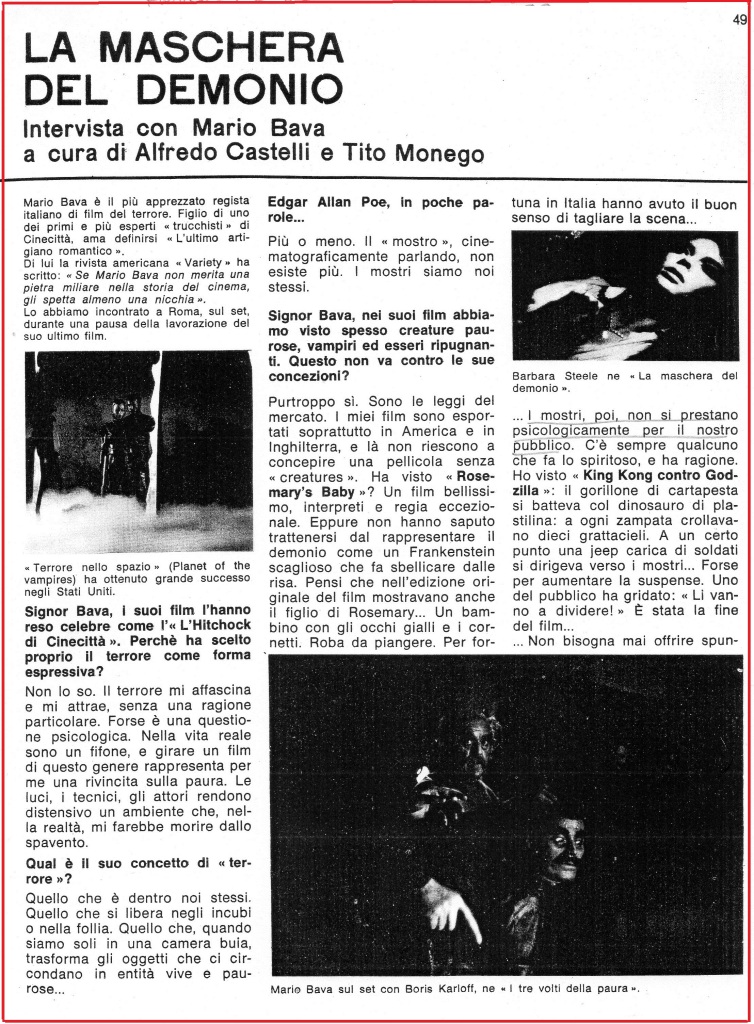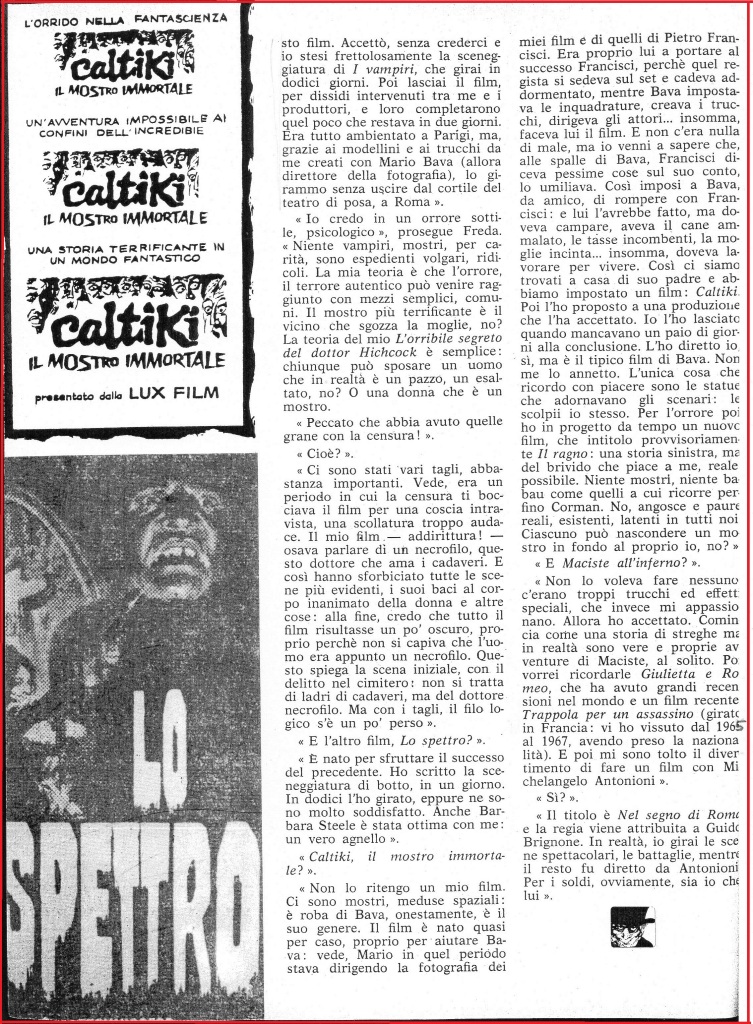This is the English translation of an interview with director Dario Argento conducted by Malcom Pagani. The interview was originally published in Italian, in the Italian monthly magazine GQ, in February 2021.
Dario Argento: Thinking about my childhood, which was very serene, I especially remember my encounter with fear. Fear made me discover unknown worlds that my friends and family couldn’t even conceive of. Thanks to literature and imagination, I enthusiastically visited these unknown worlds. I discovered abysses of the mind, drifts, horror tales, lyrical operas and tragedies that would become fundamental later in my life, when I began to work in cinema.
Malcom Pagani: What else was fundamental for you?
DA: For me it was fundamental to acknowledge that there was a part of me capable of thinking and imagining horrible things. My dark half.
MP: Did you fight your dark half?
DA: I embraced, cuddled and nurtured it. My dark half has been keeping me company for a long time now. True, it makes me do cruel and terrible things. But I have always been talking with it and I have never had the temptation of mediating [sic]. Perhaps I am being opportunistic. In fact, a lot of these cruel and terrible things end up in my films.
MP: What fears have been accompanying you throughout the years?
DA: My fears are everybody’s fears, I think. I am afraid of being attacked, of being physically hurt, of meeting evil. Some of my fears were absolutely irrational. For instance, when I was young, I didn’t want to share my bed with anybody and I didn’t want to share the intimacy of the night with anybody. I was afraid that my lover could kill me while I was asleep.
MP: Were you ever afraid of something you were writing?
DA: Yes, very often. One night I became convinced that the assassin I was writing about was actually lurking in my house, ready to kill me. I ran out of my house and I woke up the building’s caretaker. He was quite surprised. We spoke for a long time, until my anxieties subsided.
MP: According to H. P. Lovecraft, “the oldest and strongest emotion of mankind is fear, and the oldest and strongest kind of fear is fear of the unknown”.
DA: I have always been fascinated by the unknowable, by weird and bizarre things. I chased them during very long trips that I enjoyed taking by myself. When you are alone, you can think about what you see. When you are with other people, on the other hand, you have to verbalize your feelings and everything ends up in jest: we talk a lot and we understand very little. When you are by yourself, you can really understand the spirit of a place.
MP: What was your first significant trip?
DA: It was a trip to France. It was a period of total freedom. My father [Salvatore Argento] sent me to Cote d’Azur for a study vacation that was supposed to last for two weeks. However, much to my father’s incredulity and concern, this study vacation in France went on and on. My father wanted me to come back, so he stopped sending me money. He was convinced that, without money, I couldn’t continue my trip. He was wrong. I daydreamt a lot and I slept anywhere I could find a bed: I sneaked into hostels, where I ran the risk of being beaten up by the watchmen, and for a short time I shared fetid rooms with two generous and wise prostitutes. I ate no matter what, I saw a lot of movies, I confused dusk with dawn. It was one of the happiest periods in my life.
MP: You began to work as a journalist when you were very young, before you reached your majority…
DA: When my French “holiday” came to an end, I returned to Italy. I liked to write and I did my best to turn my passion for writing into a real job. My trip to France made me feel suddenly adult, and I didn’t want to go back to school. So my father introduced me to Ugo Ugoletti, the old director of L’Araldo dello Spettacolo, a small daily newspaper about film theatres and box-office results.
MP: What was your job exactly?
DA: I wrote image captions, short news, useless articles. In a short time, though, I mysteriously found myself writing for one of the best Italian newspapers. The director of [left-wing newspaper] Paese Sera, Fausto Coen, liked the idea of hiring someone to write about box-office results. My career, aided by chance, started there. One of the main film critics of Paese Sera fell ill with tuberculosis and I substituted him. I started to write film reviews that were completely heterodox if compared to the newspaper’s Communist conformism. I praised the films that I liked and Coen, who was very worried by this attitude of mine, was often forced to scold me.
MP: In 1966 you made your acting debut in a film by Alberto Sordi.
DA: I interviewed Alberto Sordi for Paese Sera. He answered my questions and every once in a while he stared at me without saying a word. When the interview was over, I said goodbye to him. But the assistant director approached me and said: “We will see each other again”. And this is how I found myself on the set of Scusi, lei è favorevole o contrario? (Alberto Sordi, 1966), playing the role of the altar boy.
MP: Were you already thinking about becoming a film director?
DA: Not at that time. My resolution to become a film director was prompted by my encounter with Sergio Leone. In the movies as in real life, Sergio didn’t like long speeches. He spoke through images and shots. He spoke the language of cinema. He was an intuitive person and he had a talent for discovering talented people. If you were worth something, Sergio understood it in a second.
MP: He saw your talent.
DA: He did a crazy thing. He put the film treatment of C’era una volta il West / Once Upon a Time in the West (Sergio Leone, 1968) into the hands of two nobodies, myself and Bernardo Bertolucci. Sergio wanted the film to be different from his previous ones, he wanted the main character to be a woman. Sergio thought that the traditional Italian screenwriters didn’t understand anything about women. So he was looking for young writers and he hired us. Sergio met Bernardo almost by chance, at a film screening, near the Viminale. Bernardo was quite confident and easy-going: “I like your cinema”, he told Sergio, “I especially love how you shoot the asses of the horses: only John Ford does it so well”. Sergio was captivated by this absence of superstructures and, after a few days, he asked us to work with him.
MP: How did it go?
DA: Bernardo and I got along fine, but the work lasted for several months and it wasn’t easy. C’era una volta il West is a very subtle film, full of plot twists and changes in the personality of the characters. In the end, we submitted our treatment, and the friendship between me and Sergio – a friendship that seemed likely to go on forever – suddenly ended. For a long time, Sergio and I had shared feelings and journeys. We even went together to Florence, to see the devastating effects of the 1966 flood.
MP: The friendship suddenly ended, without a reason?
DA: Without a reason. But cinema is like that. It seems that the shared work experience can tie people together and instead, once a job is finished, people get lost in the fog and lose sight of each other. For almost twenty years I didn’t speak with Sergio, even if I still felt a great affection for him. Then, without notice, he contacted me once again. He was having troubles with the screenplay of C’era una volta in America / Once Upon a Time in America (Sergio Leone, 1984). He needed help. He contacted me and Bernardo separately, and he tried to put the old team back together. Sergio asked us to collaborate with him, but by then we had already taken our own path and unfortunately the collaboration couldn’t be done.
MP: What is the set, for you?
DA: It is a place where I never have fun. I have never felt a great happiness while making my films. It was a job that I did methodically, with clerical diligence. A job that often left me totally empty. I felt none of that sort of fake euphoria that seems to be a fundamental characteristic of those who want to be considered film directors. I have never believed in this fake euphoria: I did my storyboard, I tried to stick to my style, I tried to survive. [Laughs]
MP: What do you remember about the making of your debut film L’uccello dalle piume di cristallo / The Bird with the Crystal Plumage (Dario Argento, 1970)?
DA: I remember a lot of difficulties. Nobody wanted to finance L’uccello dalle piume di cristallo. Italo Zingarelli – the man who “invented” the Bud-Spencer-and-Terence-Hill duo […] – didn’t feel like producing my film: “Darietto bello, I would give you my life, but I don’t understand your movie and I don’t want to put any money in it”. In the end, I don’t know how, the shooting of L’uccello dalle piume di cristallo began. I had very little money, all the people around me were sceptical, and lead actor Tony Musante and I weren’t getting along fine. We had a fight on the first day of shooting, and it became immediately clear that we would have never been friends.
MP: Why?
DA: Our personalities were too different. It became clear during shot one take one. Musante had to open a door. A banal gesture. I said “Action!” and he started to clown about. I stopped everything and I approached him: “What are you doing, Tony? This is no cabaret”. His answer I found unbearable: “I made a lot of films and you are just a debuting director, you must learn from me”. I reacted to his provocative words, which led to an animated discussion: “If you want to play the bully, you picked the wrong guy”, I told him mustering all my strength. After a few days, the shooting became a source of anguish for me. Musante was a real nightmare. I went on the set every day, and the idea of meeting him scared me.
MP: However, the film was miraculously a success.
DA: L’uccello dalle piume di cristallo was an unusual giallo. Most of the actors were unknown and Titanus boss Goffredo Lombardo (the main financier, who had been persuaded to invest some money in the film by the insistence of my father) began to think that I wasn’t able to finish the shooting. Halfway through the shooting, Lombardo proposed me to hire a “real” director to help me and I firmly declined. I finished the shooting with no additional costs, but Lombardo kept on being doubtful. I was exhausted, so it was my father who went to a private screening of the film for Lombardo (by the way, my father had invested some of his own money in L’uccello dalle piume di cristallo).
MP: What happened at this screening for Lombardo?
DA: Lombardo was angry and you could tell by his face: “The story doesn’t work!”, he said. In his view, L’uccello dalle piume di cristallo was horrible and he said that it was going to be a box-office disaster. My father left the screening room and he saw Lombardo’s secretary, Cesarina, eating her lunch. She was trying to eat a sandwich, but her hands were shaking too much. My father approached her: “What’s wrong? Are you OK?”. She replied: “I am alright, but I feel upset. This is the most shocking film I saw in my whole life…”. My father almost dragged Cesarina in front of Lombardo: “Cesarina, please, repeat to Mr Lombardo what you just told me!”. She did, but Lombardo wasn’t impressed: “So what? It is just her opinion. What does she know?”. My father replied: “She is the audience”. He was right. L’uccello dalle piume di cristallo started slowly, but word-of-mouth advertising made it a success. The film made a lot of money not only in Italy, but also in the USA, where it was the top-grossing film for two consecutive weeks. Variety wrote about this success and Musante unashamedly told me: “We made such a wonderful film together, didn’t we?”. He had forgotten all the unpleasant discussions we had during the shooting. I hadn’t forgotten and I gave him a cold answer. Revenge is a dish best served cold.
MP: Did you have other discussions on the set of the following films?
DA: Not in a violent way, because violence has never had place in my life. But, when you work with other people, it is normal to have different opinions and discuss things. Apart from Musante, I had big fights only with a Spanish actress, Cristina Marsillach. I saw her in a TV commercial and I chose her for Opera (Dario Argento, 1987). She was very young, she was perfect for the role. During the film’s preparation, everything went alright. Then I don’t know what happened, but she changed completely. It became evident that she was trying to get into fights all the time, criticizing every single aspect of the film, from the framing of the shots to the transparency of her t-shirt. Our relationship was a disaster.
MP: You have a sweet character, but firm.
DA: I don’t accept interferences and disturbances on the set. If the actors bring on new ideas to improve a scene, fine. But if the actors just want to break my balls, it means that they are trying to sabotage my work, which is something I don’t tolerate. Filmmaking is a delicate mechanism, a team play. If people don’t cooperate, it is going to be very difficult to finish the shooting.
MP: Your films are being studied all over the world. However, in Italy, your cinema has often been misunderstood.
DA: Time is a gentleman [(quality work eventually gets the recognition it deserves)], so I never cared too much about film reviews. I would have liked that the judgements on certain films of mine weren’t so biased, but I never worried too much about this sort of things. Other things got on my nerves. I remember a public-trial-like evening at the DAMS in Bologna. The year was 1972, I think. I was presenting Quattro mosche di velluto grigio / Four Flies on Grey Velvet (Dario Argento, 1971), and the audience was asking insinuating, hostile and offensive questions. The starting point was the usual cliché – “Dario Argento is a director who only makes women die” – and I was explicitly called a fascist and a misogynist. At that time I was tired, stressed-out, and my private life was full of problems. But during that particular evening I tried to remain calm and reply in a polite and kind way, in spite of all the provocations. At some point a young man stood up and, with a velvety and conciliatory voice, said to the rest of the audience: “Leave him alone! You don’t like his films but there is no need to insult him…”. That insincere plea infuriated me even more than the gratuitous offenses, and I lost my temper: “Don’t pretend to be a moderate person… Yeah, you, with that intellectual-style tie… You are an asshole, just like all the others!”. I insulted everybody, calling them “a flock of sheep”. At the end of my speech about free thought, I realised that I had silenced the debate instead of stimulating it.
MP: You often had to fight against censorship too.
DA: Censorship was often very mean with my work to the point that, on numerous occasions, I had to jump through hoops to save the copies of my films that had been cut to pieces. For instance, Opera – a film that cost me a lot of time, preparation and effort to make – was badly butchered by censors. It was a hard blow for me and I fell into depression.
MP: Did this often happen to you?
DA: I suffered for the outcome of some of my films. I sometimes felt empty, tired, with no desire to go on. I am 80 years old and for very long periods of my life I have lived in hotels. I have always liked hotels. They are impersonal, perfect for finding concentration. They don’t belong to you and you don’t belong to them.
MP: Why are you telling me this?
DA: Because in one of my favourite hotels in Rome – Hotel Flora, near via Veneto – I almost killed myself in the winter of 1976. I was preparing Suspiria (Dario Argento, 1977) and my career was going great, but inside myself things were far from good. I woke up one night with the desire to jump out of the window. A couple of weeks later, I had the same feeling and I even started to imagine my body hitting the ground, the sound of the crash, the noise all around, the titles in the newspapers. I started to walk towards the window, but the furniture prevented me from reaching it. I woke up in tears the next morning, my hands still grasping the curtains, and I immediately phoned a doctor friend of mine. He told me: “Suicide is a one-way street: if you take it, you can never go back; but if you do a U-turn at the right moment, you will never think about it again…”.
MP: How did you manage to overcome the suicide drive?
DA: My doctor friend suggested me to put all the furniture in front of the windows. It worked. I had to fight depression, but I managed to get back on my feet and I have never thought about killing myself again.
MP: Solitude has a price.
DA: In that hotel I used to invite friends to have parties but, after the last guest was gone, I always felt very alone. I have never had many friends. The pleasure of solitude has its price, indeed. Solitude is a drug.
MP: What is your relationship with drugs?
DA: Hashish kept me company for a long time. I would have continued to smoke hashish, but I couldn’t. I had to quit because of chronic bronchitis and coughing fits. It was very difficult. I also took cocaine for a little while, but I quit immediately because I didn’t like cocaine. Cocaine annoyed me. It made me feel sick. I couldn’t relax. It was natural for me to stop taking it.
MP: What do you remember about the time you were arrested?
DA: An unknown person sent some drugs to Fiumicino [airport] and he or she put my name on the package. The narcotic squad got hold of the package and came to my house. I let the policemen in and I candidly admitted that I was a hashish smoker. I showed them the small quantity of hashish in my possession. They took me to Regina Coeli [a prison in Rome]. I didn’t want to end up in a dramatic situation like “Famous director busted for drugs”, so I tried to make the policemen laugh.
MP: How?
DA: I smiled and I said something in Roman dialect… Something like “Don’t smoke my stuff while I am away”. The policemen weren’t amused. They were embarrassed.
MP: You have always liked to have a good laugh.
DA: I like to have a good laugh as much as I like a good scare. My films are full of ironic and grotesque elements, even in the most dramatic situations.
MP: What is fear, for you?
DA: Noir, horror and giallo are just words – containers for our dreams. Fear is a feeling. A feeling different from the shiver you feel when watching a film that scares you. Fear is born from the subconscious and everybody has a subconscious, even if sometimes we pretend that the subconscious doesn’t exist.
MP: Do you feel that you are a lucky man?
DA: I am a very lucky man. Growing up, I never thought about working as a film director and, instead, making movies has become a strong necessity for me – a desire that still gives me energy. I still have a lot of films in my head, a lot of stories to tell. And I want to keep filming these stories because, without cinema, the world appears to me as a poor, empty and insignificant place. I don’t have many certainties, but one thing is very clear to me: as long as there will be a person to be scared in the movie theatre, I can call myself a happy man.
MP: In May 2021 you will start to shoot a new film.
DA: The title is Occhiali neri [Dark Glasses]. Maybe we already have the cast. It is a strong story, I have been thinking about it for many years now.
MP: How does it feel to be 80 years old?
DA: It is a very strange feeling. I don’t feel like an 80-year-old man. And then there is a curious thing: the more I grow old, the more my audience becomes younger.
MP: Do you ever think about death?
DA: How can you avoid thinking about death? Death scares us all. One day it will happen to me. I hope that I will be ready.


